#where is my inevitable bbc mini-series
Link
Sometimes the best Christmas presents are the ones we don’t think we need; a new Christmas Carol, for instance. Indeed it may be indicative of a certain unappreciated vacancy around the Christmas tree that in discussing the BBC’s new version of the Dickens classic both its director and leading man refer back to The Muppet Christmas Carol made way back in 1992.
“I was sent the script,” admits Nick Murphy, best known for directing the Rebecca Hall ghost movie The Awakening, “and my first thought was, ‘For God’s sake! The Muppets! They nailed it. What’s the point?’ ”
Joe Alwyn, who plays Scrooge’s clerk Bob Cratchit in the BBC three-parter, has meanwhile posted a trailer on Instagram with the caption: “Hard to fill the shoes once worn by Kermit. But I tried.” The self-deprecation was quickly “hearted” by the singer Taylor Swift, who is the actor’s girlfriend and who will be watching the mini-series with Alwyn and his family in London in the final days before Christmas.
There is nothing wrong, of course, with The Muppet Christmas Carol. It is probably in most people’s top three adaptations of Dickens’s masterpiece (alongside, I would say, Alastair Sim’s 1951 version and Scrooged). Its endurance does suggest, however, that it may be time someone did something a bit more serious, a little darker and a touch more grown-up with a tale that excoriated Victorian neglect and associated Christmas with the relief of poverty for ever more.
And this is exactly what Nick Murphy has achieved with a bracingly fresh script by the Peaky Blinders creator Steven Knight. Guy Pearce’s Ebenezer Scrooge is still a “squeezing, wrenching, grasping, scraping, clutching, covetous old sinner”, but since Pearce is only 52, there is rather less of the old. At the end of the novel, Dickens wrote that “ever afterwards” — that is after Scrooge’s Very Bad Night — “it was always said of him that he knew how to keep Christmas well”. That is rather more of an achievement when, as in this version, you may have 40 Christmases, rather than a couple, left to you.
Equally remade is Cratchit, who in Alwyn’s incarnation is far from the bashfully gulping frog thanking his master for granting him Christmas Day off before scampering back to Miss Piggy’s fleshy arms. Although Alwyn grew a rough beard for the part, his is also the best-looking Bob Cratchit you have seen. As the actor and I talk at the Picturehouse Central cinema in London, I find him as mesmerising off screen as on.
“Bob is trapped by Scrooge,” Alwyn says. “He’s abused by him. He’s not treated fairly. He’s there only because he has to be. He’s treated like shit.”
I’d say there’s a definite feeling in their shared scenes that Bob might just snap and hit Ebenezer over the head with a poker. “That was the intention. He’s at breaking point. He’s pushed right to his limits and Scrooge, I think, relishes winding him up. All Bob can do is hold his ground and fight back as much as he can — but he isn’t such a sap in this version.”
Scrooge and Cratchit’s relationship so much resembles an unhappy marriage that the niggling, bitter exchanges invented by Knight, with very little reference to Dickens’s dialogue, resemble Steptoe and Son rewritten by Strindberg. The easy contrast would have been with the Cratchits’ poor but happy marriage, but this too comes under scrutiny. There is an acknowledgment of the challenges a disabled child can bring to a household, and it is somehow emphasised by Tiny Tim being played by Lenny Rush, an extraordinary young actor, aged ten, who has a rare form of dwarfism called spondyloepiphyseal dysplasia congenita, the same condition as Warwick Davis.
“It really mattered to me that nobody was photo-fit,” Murphy says from a studio where he is dubbing the last episode. “Bob Cratchit is always a winsome, put-upon nice guy and the Cratchits themselves represent this idea of an ideal, working-class, lovely family. So we looked into their relationship on the page and there seems a genuine tension between Bob and his wife. Things are hard. It isn’t easy to have no money and a disabled child, and they lean on each other and they’re not straight with each other and there is a genuine antagonism between them.”
Knight has written into the narrative a family secret that connects the Cratchits to Scrooge. The secret belongs to Mrs Cratchit, played by Vinette Robinson, whose part is greatly expanded; indeed, the novella does not even grant her a first name, although the Muppets, and other adaptors, opted for Emily.
“Inevitably the secret begins to surface and cracks appear in the family,” Alwyn says. “Something has to happen. I think what Steven has done is take the story and drill deeper. He hasn’t taken too much liberty. It’s not bending the truth too much from what Dickens would have wanted. Or I hope not.”
Murphy insists that worthwhile adaptations of classic texts should be “edgy” and have “a good bite to them”. “If you absolutely don’t want any variation from the book then I strongly suggest you sit in a corner at Christmas and read it again. But if you want to see it used as a prism through which we can see a broader and slightly different subject explored, then this one’s for you.”
Alwyn’s performance is part of the iconoclasm. “Joe’s instinct as an actor is always to push away from the obvious and into ambiguity,” Murphy says. “He’s very quietly spoken. He’s not brash at all. He’s a gentle, intelligent guy, but he just simply wasn’t interested in fitting a Dickensian cliché.”
“I’ll take that,” Alwyn says when I pass on the compliment, having not considered his technique in such terms. He is 28 and would probably accept that he is best known for two facts: the first is that he is Taylor Swift’s boyfriend; the second that, aged 25 and with no professional acting experience, he won the title role in an Ang Lee movie.
He is from north London, the middle of three sons. Their father is the television documentary-maker Richard Alwyn, renowned for making The Shrine about the public reaction to Princess Diana’s death.
“He was away a bit,” Alwyn says. “He made quite a lot of films in Africa when I was growing up. He was often in Uganda, Rwanda at one point, South Sudan. So he’d come back with stories and artefacts from all over the place. He made a great documentary in Liverpool during the World Cup about two kids on an estate growing up there.”
His mother, Elizabeth, is a psychotherapist. So, I say, although his family were comfortably off and he was sent to the fee-paying City of London School, he knew something of other people’s lives?
“All different kinds of people, all different kinds of stories,” he says. “Obviously, she couldn’t share them with me in the same way that Dad could, but both their jobs take an interest in other people and are about how to empathise, understand, and listen to stories and tell stories. I suppose it’s not a million miles away from an actor’s job; listening to other people, understanding them, trying to tell stories.”
I ask about the contemporary political resonances of A Christmas Carol. I cite the wealth of certain members of his profession and of Swift’s. Only the other day I have read that she has a private jet so she can visit Alwyn on a whim. He promises me that 99.9 per cent of what the press write about them is false, and this is an example.
I ask if he finds it embarrassing.
“Find what embarrassing?”
The disparity between the amount some people earn and the wages of workers in, say, Amazon fulfilment centres.
“I saw something in The Guardian the other day, I think, saying that the top six richest people in the UK accumulate the same amount of wealth as the poorest 13 million. I think that was the figure,” he says.
And politics today?
“It’s bigger than Scrooge, but it’s the same thing amplified; not being able to see beyond yourself, building walls, cutting yourself off from other countries. If there was ever a story to counter that, featuring someone who epitomises that and then who remembers who he is as a human being, it is A Christmas Carol.”
Unlike the young Dickens, Alwyn was not a boy to stand on a table and sing and dance. As a child he auditioned to play Liam Neeson’s son in the Richard Curtis film Love Actually, but didn’t get it. He harboured ambitions to act, but pursued them only later at the University of Bristol, where he took plays up to the Edinburgh Fringe. One night he acted before an audience of one: the writer’s mother. Undeterred, he went on to the Royal Central School of Speech and Drama, joining the scramble at the end to find an agent. Weeks later, his new agent rang to say that Ang Lee was working on a new film, Billy Lynn’s Long Halftime Walk, and wanted to see an audition tape.
“I got some mates to film me in a lunch break and then my dad filmed another scene, and we got a call that night saying, ‘He wants to meet you this weekend. He’s saying, we’re going to put you on a plane and take you out of school. Come for the weekend. Learn these scenes.’ ”
As Billy, a young US Marine fêted for killing an enemy assailant in Iraq, Alwyn was painfully believable; a virgin solider returning home to be exploited for an act that had devastated him. The film did not do well, mainly because it was shot at a hyper-reality frame rate that few cinemas had the technology to show, but Alwyn was on his way.
“Things only evolve by change and people taking risks,” he says. “And Ang Lee is someone who I admire for that. None of his films are the same. Maybe thematically they draw on the same things, but he’s always pushing the boundaries.”
The same can be said for A Christmas Carol and, even more, about Yorgos Lanthimos’s The Favourite, in which Alwyn appeared alongside Emma Stone and Olivia Colman. It applies less so to his other recent films, Mary Queen of Scots, Boy Erased and now Harriet, a faithful biopic about the slave liberator Harriet Tubman in which he played a slave owner’s son. What he has managed to do consistently is work and learn from some seriously good actresses — Colman, Stone, Saoirse Ronan and Cynthia Erivo. “I know. I am targeting them,” he jokes.
I tell him my daughters have insisted I ask if he minds Swift writing songs about him (whole albums, actually, but check out London Boy if you are in search of a little cringe). “No, not at all. No. It’s flattering.”
Does it matter to him that the press — it’s a bit metatextual this, I admit, for I’m probably doing the same thing — make it obvious that they are as interested in his girlfriend as they are in him? “I just don’t pay attention to what I don’t want to pay attention to,” he explains tolerantly. “I turn everything else down on a dial. I don’t have any interest in tabloids. I know what I want to do, and that’s this, and that’s what I am doing.”
The boyf, described only the other day as “mysterious” in one of those tabloids, is no mystery at all. He knows what he wants for Christmas, and it is the career he is already forging.
A Christmas Carol begins on BBC One at 9pm on Sunday
139 notes
·
View notes
Text
SCANDINAVIAN REFERENCES
________________________________________________________________
In Sherlock BBC - and also a little bit outside of it
While writing on DISTRACTION & CONSEQUENCES and CABIN ON THE MEADOW, involving Phil with his ‘explosive’ car and the Hiker with the bashed-in head, I couldn’t fail to notice that Phil’s unmoving car is a SAAB … which is a Swedish brand.

According to the informations given during the promotion campaingn for the Escapre Room, TheGameIsNow, Sherlock lives currently in Sweden. Since these aren’t the only occasions where Scandinavian regions are mentioned in Sherlock BBC, the suspicion inevitably arose that those references could be of some importance. Reason enough to make another little list. :)
TBC below the cut ….
Short definition of Scandinavia
The term Scandinavia in local usage covers the three kingdoms of Denmark, Norway, and Sweden.
In English usage, Scandinavia also sometimes refers to the Scandinavian Peninsula, or to the broader region including Finland and Iceland. x
A Scandal in Belgravia
As mentioned above, Phil’s immobile car, which ‘explodes’ and thus distracts the Hiker who, as a consequence, is killed by his own boomerang, is of the Swedish brand SAAB.
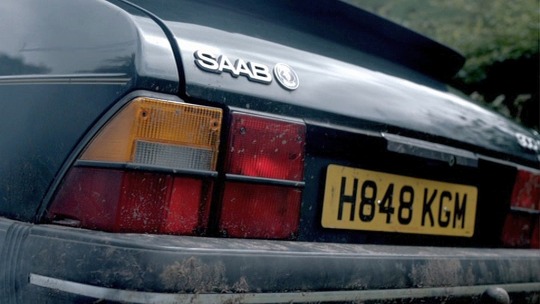
The Empty Hearse
Mr. Howard Shilcott, the ‘train guy (and mirror for Sherlock), possesses important informations about the Underground station at Sumatra Road, which once was built but then closed before it ever opened. He wears a ‘funny hat with earflaps’ made of Islandic sheep wool. That hat becomes an object of significance when Sherlock invites his brother to play deductions with him, just like in the old days.
MYCROFT: The earlier patches are extensively sun-bleached, so he’s worn it abroad – in Peru.
SHERLOCK: Peru?
MYCROFT: This is a chullo – the classic headgear of the Andes. It’s made of alpaca.
SHERLOCK: No.
MYCROFT: No?
SHERLOCK: Icelandic sheep wool. Similar, but very distinctive if you know what you’re looking for. I’ve written a blog on the varying tensile strengths of different natural fibres.
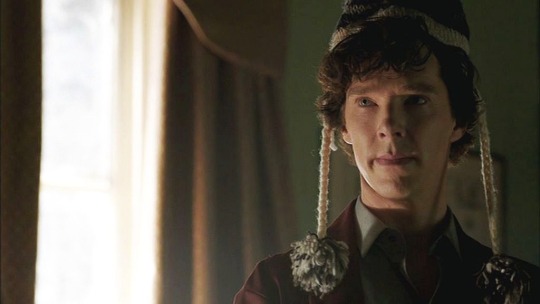
His Last Vow
The main villain of this episode is designed after Doyle’s British character Charles Augustus Milverton. For some reason, in this adaptation, name and origin of the man have been changed into Charles Augustus Magnussen, who is now from Denmark. The fact that he is ‘foreign’ is driven home explicitly right at the beginning of the episode by the dialogue as well as the accent of the man, who is played by Danish actor Lars Mikkelsen.
GARVIE: Do you think it right that a newspaper proprietor, a private individual and, in fact, a foreign national should have such regular access to our Prime Minister?
MAGNUSSEN: I don’t think it’s wrong that a private individual should accept an invitation. However, you have my sincere apologies for being foreign.

The Six Thatchers
Mr. Kingsley, a client, thinks that Sherlock’s deductions, once explained, are actually dead simple. Highly annoyed, Sherlock spontaneously invents a ludicrous story and tells the shocked man that his wife is actually Greta Bengtsdotter, Swedish by birth and the most dangerous spy in the world. She secretly works for none other than James Moriarty and uses her unsuspecting husband as cover to hide her true intentions which will finally precipitate in World War III.

The first location Mary visits on her hiatus is Norddal in Norway. That’s a small place (ca. 1660 inhabitants) deep inside the Storfjord. Here she picks up a fake passport hidden inside the stonewall of a coastal watchtower. Her new name, Gabrielle Ashdown, is taken from TPLOSH, where Holmes chooses the pseudonym ‘Mr. and Mrs. Ashdown’ for himself and Gabrielle Valladon, the woman who consulted him in the case of her missing husband but is actually Ilse von Hofmannsthal, a German spy who pretends to be Mrs. Valladon.

The Final Problem
One of the very last scenes of this episode shows a man dressed as Viking, including the (cliched) horned helmet. He lies motionless on the floor in the livingroom of 221b Baker Street (played by Paul Weller). John bends over him and examines his left eye.
Vikings were highly skilled Norse seafarers who raided and pillaged (like pirates) with their infamous longboats (also well known as dragonboats). They acted as mercenaries but also as merchants, who traded goods across wide areas of Europe, North Africa, the Middle East, European Russia and the North Atlantic islands. Some of them even reached the North-Eastern coast of North America. (X)

That Viking is not the only character in this story who ‘wears horns’. Furthermore, cow horns are also connected to the eye-goddess Hathor, whose other, dangerous side is represented by lioness goddess Sekhmet.
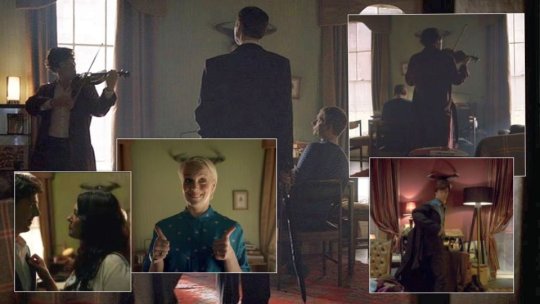
The way this Viking lays there … one leg sharply angled at the knee, the foot shoved beneath the other, outstretched leg and both arms straight beside his torso … it’s a bit odd and strangely reminds me of the ‘dancing men’ drawn on the blackboard in the shot displayed immediately before this one. It almost looks like the way this man lies there could have some meaning.
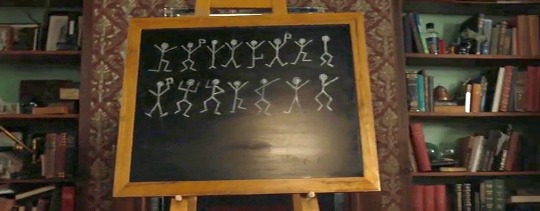
And something else comes to mind: the way John bends over the Viking stunningly resembles the scene from Magnussen’s office in HLV, when Sherlock got shot by Mary. One could even say, there are three potential ‘pirates’ gathered in Magnusson’s bedroom in that scene ... Sherlock, John and ‘Viking descendent’ Magnussen. Interesting ...

The Game is Now - Escape Room Promotion
With the cliffhanger of The Final Problem in mind and still no official announcement regarding a fifth series on the horizon, one could come to the assumption that the ‘TheGameIsNow- EscapeRoom’ event serves as a sort of interlude and somehow resembles a ‘SherlockBBC-Hiatus’ (hopefully). Isn’t it interesting that here too, Scandinavia seems to play a role?
During the conversation with Mycroft, in the intercepted message Nr 1, Sherlock mentions that he currently is in Sweden.
During the intercepted message Nr 2 a map of Scandinavia is shown in the background with informations regarding its natural recources: iron ore, copper, zinc, gold, IKEA and uranium.
Additionally Mycroft confirms a second time where his brother might be found at the moment: ‘Missing, rumoured to be in Sweden’ is written below a picture of Sherlock, kept in black and white, but temporarily overlaid with pink and green (Study in Pink and Green)

Scandinavian canon reference regarding the ‘hiatus’
In Doyle’s original story The Empty House, Sherlock Holmes tells Dr. Watson after their reunion that, for some time during his hiatus, he had stayed in Norway under a fake identity.
“You may have read of the remarkable explorations of a Norwegian named Sigerson, but I am sure that it never occurred to you that you were receiving news of your friend.” (ACD, The Empty House)
Using Sherlock’s own words from The Great Game, one could say that, by now, the story told in Sherlock BBC as well as the EscapeRoom event have a … ‘distinctly Scandinavian feeling about it’. :)
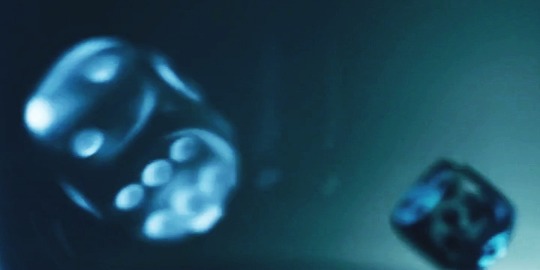
Some Scandinavian side notes outside Sherlock BBC
Not Sherlock related. Should be taken with caution and humor:
Radio Times, November 2018: Steven Moffat and Mark Gatiss reveale that Danish actor Claes Bang will be playing Dracula in their new series. ‘Hell has a new boss’ says the headline. Strictly speaking, the boss in Hell is generally considered to be the Devil (maybe also his grandma :) but surely not Dracula, who is after all just a human who desired immortal strength to protect and revenge the ones whom he loved. At least, that’s the story told in ….
Dracula Untold (2014) - some quotes:
"One day I will call on you to serve me in an immortal game of revenge … to unleash my wrath against the one who betrayed me."
“This is not a game!”
"Oh, what better way to endure eternity. For this, is the ultimate game. Light versus dark, hope versus despair. And all the world's fate hangs into the balance."
Vlad Dracula meets his creator Let the games begin
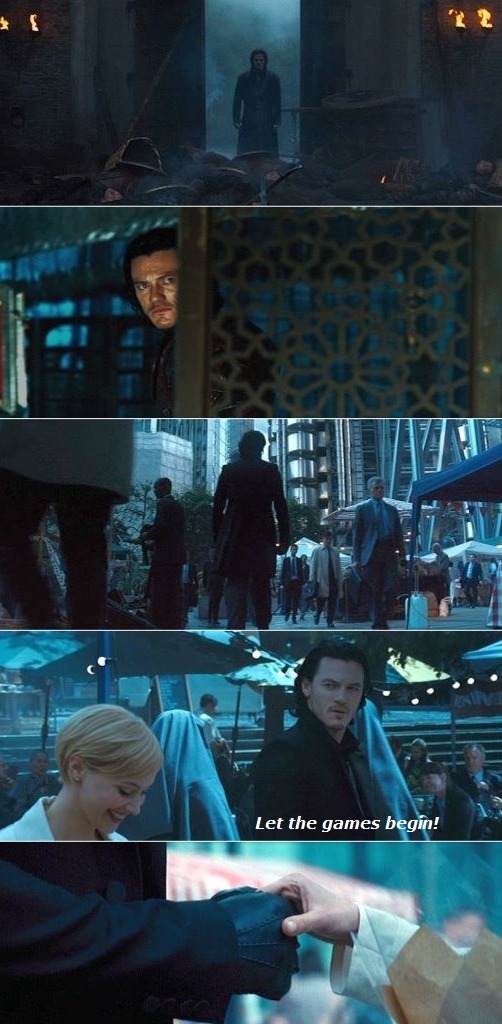
“You want me to shake hands with you in Hell? I shall not disappoint you.“ (Sherlock at Jim Moriarty, TRF)
How Dracula BBC came into being
“It came about several years ago,” Gatiss said. “We were filming — we’d just started the third series of Sherlock, where he comes back from the dead, and we had to break off after two days to go to the RTS Awards (March, 2013) and I had a picture on my phone of Benedict silhouetted against the door of Mrs Hudson’s room. I showed it to Ben Stephenson, who was then the Head of Drama [at the BBC], and I said, ‘Looks like Dracula’. And he said, ‘Do you want to do it?'” (RadioTimes, April 2019)
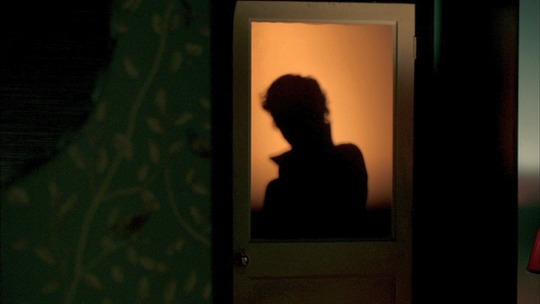
“We’re gonna go all Dane“
The same article from RadioTimes, contains an interview with Steven Moffat and Mark Gatiss. When asked about their upcomming mini-series ‘Dracula’, if there will be more ‘homegrown talents’ among the cast, the producers answered the question in their most familiar way - with lots of laughter and giggling - obviously taking much pleasure in the announcement of their new ‘informations’.
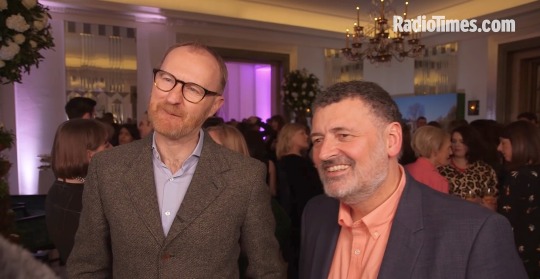
“No, no ..., it’s strictly Dane from now on. We're only casting over Denmark. I don’t think Denmark’s being sufficiently represented and so we’re gonna go all Dane.”
Strictly Danes …. well, well …. I’m more curious than ever ... and extremely exited! :))))
On Scandinavian name-giving tradition
It is a well known custom in Scandinavian regions to create personal names based on the given name of one’s father, grandfather or male ancestor by adding the ending -son/-sen/-søn or -dotter/-dottir/-dattir. This is called a patronymic (while the same method based on the mother’s name is called matronymic). A good example for this in Sherlock BBC is the character Charles Augustus Magnussen …. Magnus-sen = son of Magnus.
This kind of Scandinavian name-giving tradition is based entirely on first names. Just assuming though, this method would also be applied to last names, then ... a female descendent of someone with the family name ‘Bang’ could be named ... ‘Bangsdotter’. :)))
A last funny detail: the subtitles for Sherlock BBC, Series 4 (British Edition), display the name of the famous Swedish spy, Sherlock invents in TST, as Greta Bengsdotter. The correct spelling of the first name of Greta’s father (used here as patronymic) isn’t Beng though …. but Bengt.
Bengt (female, Bengta) is the Swedish equivalent of … Benedict. :)))

As I said above ... to be taken with caution and humor. :)))))
Thanks @callie-ariane for the scripts. Related post by @tendergingergirl
Mai 2019
#scandinavian references#sherlock bbc#the game is now#escape room#scandinavia#sweden#norway#denmark#iceland#dracula untold#hell has a new boss#let the games begin#this is not a game#vlad dracula
38 notes
·
View notes
Text
So I finished Tipping the Velvet yesterday.
I really liked it... Like I kinda want to read it again, which I haven’t had with a book since high school, easily. .
..Technically, I had the same reaction to Fingersmith, which I read, what maybe a month ago (shit, has it already been that long? I’m really losing track of the year... I don’t know, I’m losing my marbles). Anyway, that was different, because same author, so it doesn’t count. Also, Tipping the Velvet, I want to go back, like to specific bits and read them again, and get a better feel of what the characters were going through. Maybe because, with Fingersmith I watched the mini-series first, then read the book after, so I already knew what the plot was and I could just enjoy how the story was structured in how information was revealed to the reader and the information that’s hidden in plain sight, like when Susan, right near the beginning says how she sometimes felt that Mrs Sucksby loved her as a replacement for a lost daughter, and how she didn’t like that feeling. Whereas with Tipping the Velvet, I read the book first and then went on to the mini-series after. And, even though there’s a lot of things that I like about the mini-series and I understand that somethings had to be sacrificed to make a cohesive narrative that would make sense to someone who might never read the book and not feel like sections had been lifted directly from a book and shot with zero in the way of adapting to a compacted, visual medium (which is how I felt about the bit of Desert Hearts that I watched. I’ve never read the book, but it feels like a book minus the connective tissue of a narrative built up over chapters and without the ability to know precisely what a character is thinking and feeling in a particular moment. Like, I didn’t think it was terribly bad. In many ways it was quite good. It just didn’t have any narrative or emotional thrust to it).
Anyway, where was before I got carried away? Right, the Tipping the Velvet mini-series. I really liked Nancy’s dream of Kitty right near the beginning, with her coming into Nancy’s bedroom all decked in a tuxedo. You know, all kind of sexy and non-threatening like a kid dreaming about a member of a boy band, or something. Kinda made me think of Sailor Moon fantasizing about Tuxedo Kamen. Very cheesy and funny and a really appropriate way of getting across how young she is at the time. Nice way to set up how generally horny Nancy is as a character, too.
Making most of the sexual content kind of bawdy and silly, while I kind of prefer how in the book it’s treated more matter-of-fact, I do think it does tie into the theatrical theme that connects the mini-series in a clever way. I mean, it probably made it a little bit easier to get that much sex onto TV, although apparently the BBC didn’t mind too much. Yeah, the framing device of the stage is quite a clever way of structuring what is closer to an autobiography than a story with a plot and makes it easy to condense the themes and the changes that the protagonist goes through without feeling really bloated. Although, the time spent with the protagonist and how she changes over years is one of the main reasons I like the book and why I want to reread it. I also like just how gay the book is. Not to say that the mini-series isn’t gay, but I kinda miss that a major part of Nancy’s arc, being openly butch, doesn’t feel quite as strong as it is in the book. Like I get it, casting real live people to represent characters that, by their very nature of being fictional characters in a book, can be literally anything, is an imperfect art and you just have to pick the person that will suit your purposes best. And I like that a lot of the side female characters are masculine presenting. Again, probably more of an inevitable side effect of adapting a book to screen than anything.
One thing that I thought was clever with the book, was the way that Nancy holding on to Kitty was presented. I’m probably not going to explain this well, but I liked the way towards the end of the book, it almost started to feel that the reader was holding on to their relationship more than Nancy was. Like, with the prominence that she was given in Nancy’s life and in the decisions that she made in the book, in most stories that’s how you tell the audience that she’s the love interest, that the hero’s going to get her in the end. But as the story goes on, particularly after Diana kicks her out onto the street and Zena makes off with what little money they had, her narrative moves her further away from Kitty. Like, she keeps having these relationships with other women, significant relationships, and even though Kitty definitely comes up, particularly towards the end, they all move her further away from the person she was when the two of them were together. Most stories would have the protagonist lose the love interest, grow and mature as a person, then return and win the love interest back as resolution to the hero’s arc. In Tipping the Velvet, that turning point should have come after she left Diana, maybe a little bit after Florence and Ralph take her in. But it doesn’t. Florence gains increasing prominence in Nancy’s life and she moves further and further away from Kitty without even realizing it. I know, there have been other stories where the hero ends up with someone other than the initially introduced love interest, it’s just not usually so subtle. A lot of stories would be tempted to make the initial love interest a raging arsehole, so that the audience would know that the hero is destined to leave them. Kitty’s not that bad. Even the main point of contention between them, Kitty wants to stay in the closet, Nancy wants to be be more public with who she is and who she loves, isn’t that big of a deal when they’re together. Nancy was happy to go along with what Kitty wanted and only realized what she was missing when they’d been apart and she could live as she pleased. It’s like a romantic comedy where the protagonist’s childhood friend or their first love comes back on the protagonist’s wedding day, and the protagonist doesn’t run off them. It’s great, I love it.
#long post#I'm tired and I waffled a bit#...more than a bit really#hopefully now that I've got that out of my system I'll be able to get a good nights sleep#I couldn't sleep because I was thinking about this damn book
0 notes